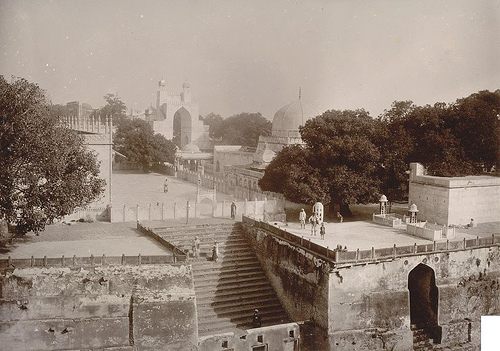Category Archives: Islam
Alastu Bi-Rabbikum–Am I Not Your Lord?
- Those spirits that on hearing their Lord’s call fell into sajdah (prostration) replying with heart and limb, “Balaa (Indeed)!”
- Those that made sajdah but didn’t do so with any sincerity.
- Those that believed sincerely with their hearts only.
- Those that didn’t care to reply–neither with heart nor limb.
The khwaja, may God have mercy on him, then clarified each category.
Translated by Sharaaz Khan
9 Rajab 1432 Hijri
The Prayer of the Aspirant
A Tribute to the Beloved of the Beloved of Allah
https://www.iecrcna.org/site/classes/the-history-of-karbala-english/
Â
“Your best friend is your Din (religion)â€
“We live for others and not for ourselves.”
— Hazrat Imam Husayn radi Allahu anhu
Hazrat Imam Husayn radi Allahu anhu’s martyrdom on the 10th of Muharram is the ultimate tribute to sacrificing oneself for the sake of the greater good. When Imam Husayn radi Allahu anhu was confronted with the call for pledging allegiance to Yazid, the ruler at that time, he radi Allahu anhu refused on account of the fact that Yazid was a tyrant and transgressor. Imam Husayn radi Allahu anhu’s confrontation with Yazid was a call for justice and restoration of the Shari’ah. Yazid had done many anti-Shari’ah acts just one of which was that he had committed the sacrilegious act of tying horses to the Mosque of the Holy Prophet sal Allahu alayhi wa Aalihi wa sallam, and they had soiled the blessed mosque. Imam Husayn radi Allahu anhu exhorted and warned Yazid three times to give up his tyrannical and blasphemous ways and to pledge allegiance to the family of the Holy Prophet Muhammad sal Allahu alayhi wa Aalihi wa sallam. However, this call for rectification fell on deaf ears.
Some 72 lovers of the Holy Prophet sal Allahu alayhi wa Aalihi wa sallam were forced to take on the huge army of Yazid that had laid siege upon them. The martyrdom of Imam Husayn radi Allahu anhu and the rest of the martyrs of Karbala was the price paid for the fortification and safeguarding of Islam and the guarantor for this religion having reached us today.
Seventy thousand angels alighted in the grave of Imam al-Husayn ibn ‘Ali (may Allah Almighty be pleased with them both) on the day when he was mortally wounded, and they will continue to weep over him until the day of Resurrection. [Al-Ghunya li-Talibi]
Allah, The Most Exalted chose martyrdom for the grandson of our Beloved Prophet sal Allahu alayhi wa Aalihi wa sallam on the most noble of all days, the most glorious of them, the most majestic of them, and the most exalted of them in His sight. In doing so, the purpose of Allah Almighty was to grant our great Imam radi Allahu anhu increased elevation in degrees and tokens of special favor over and above the special favor he already enjoyed. By way of martyrdom, He Almighty caused him radi Allahu anhu to reach the stations of the rightly guided Khalifas, who died as martyrs. [Al-Ghunya li-Talibi]
Like the angels, those who have love in their hearts for Imam Husayn radi Allahu anhu weep tears and feel pain on this sad day. However, it must not be observed as a day of tragic misfortune. Instead it must be regarded as an remarkable day full of blessings and opportunities to reap plentiful rewards from the Merciful One, The Most Exalted and attempt to perform as many righteous deeds as possible.
If it had ever been permissible to observe this day as the day of tragic misfortune, the Noble Companions and Successors (may Allah be pleased with them all) would have observed it as such, because they were more closely in touch with it than we are, and better qualified to understand its true significance. In actual fact, as we know from traditional reports about them that they used to urge people to treat their dependants with special generosity on that day and to observe it as a day of fasting. [Al-Ghunya li-Talibi]
It is highly recommended to fast on both the 9th and 10th of Muharram.
Ay Habeeb-e-Khuda ke Lakht-e-jigar
Ali Sher-e-Khuda aap ke hain pidar
Kar de Aaqa karam ki hum par ek nazar
Ummat-e-Naana aaj badi pareshan hai
Ay Habeeb-e-Khuda ke Lakht-e-jigar
Syeda Fatima ki aankhon ki thandak hain aap
Hazrat Hasan ke Mubarak bhai hain aap
Us Panjtan Pak ke chamakte sitaare hain aap
Jinki muhabbat is Ummat par farz hai
Ay Habeeb-e-Khuda ke Lakht-e-jigar
Aapne haq Karbala ka ada kar diya
Is Ummat par azeem ehsaan kar diya
Haq-o-baatil mein vaaze furqaan kar diya
Is Ummat ko aap par bada naaz hai
Ay Habeeb-e-Khuda ke Lakht-e-jigar
Raah-e-Haq mein aapne apni jaan di
Raaza-e-Ilahi pe har cheez qurban ki
Istiqamat-o-sabr ki aala taaleem di
Is Ummat ke aap pesh-o-imam hain
Ay Habeeb-e-Khuda ke Lakht-e-jigar
Naazil huay farishte sattar hazaar
Chali jab us pak gardan par talvaar
Bahaate hain aansoo vo zaar-o-qattaar
Har sachche Ummati ka bhi yahi haal hai
Ay Habeeb-e-Khuda ke Lakht-e-jigar
De Aaqa karam ki hum par ek nazarÂ
Radi Allahu anhu!
















